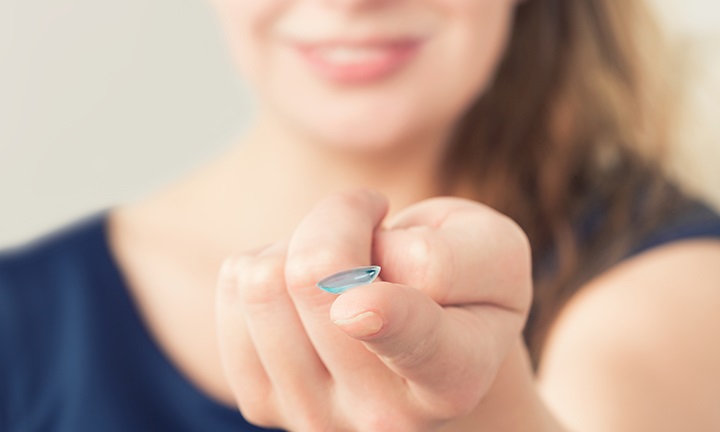Did you know there are an estimated 30,000 sports-related eye injuries every year? It’s so important to keep your vision protected and safe all year round. April is Sports Eye Safety Month and we’d love to show you how easy it can be to protect your eyes and keep seeing clearly and safely while playing sports.
Do you actively participate in sports? Do you currently wear glasses or contacts? If you answered YES to these questions, you are not alone. According to the Vision Council of America there are just over 83% of adult Americans that use some form of corrective eyewear, including eyeglasses, reading glasses, and contact lenses.
Why is eye protection essential for sports?
Preventing eye injuries begins one step before donning safety glasses, with something you might not expect: corrective eyewear. Simply by correcting your vision, you are giving yourself the best chance to prevent a problem before it happens — whether that’s an incoming ball or a trip hazard on the ground — and to respond appropriately before any injury occurs. Of course, your regular eyeglasses (and definitely not your contacts) are not a safety solution for outdoor sports or any high-risk activity. For any activity where your eyes are at risk, you’ll want to give your eyes the best appropriate gear to prevent any injuries.
How can I select the right sports safety glasses?
If you wear contact lenses it’s simple to get your eyes covered and protected for any activity. Shop around and pick up sport-specific safety glasses in outdoor shops or online retailers. Make sure they fit well and are comfortable enough to almost forget they’re on, so you have no problem wearing them every time you play.
For those who wear prescription glasses, you can buy safety shields that fit over your existing glasses. This is a simple solution that doesn’t require purchasing another pair of prescriptions.
Are sports a big part of your happiness? Fantastic. You’re a great candidate for a second set of prescription glasses designed for your sport. Whether you choose lightweight running glasses, prescription ski goggles, or tough and durable eyewear for high-impact sports like basketball, you can be sure to get exactly what you need to see clearly and keep your eyes happily protected.
Will regular glasses and sunglasses provide sports protection?
The short answer is “no.” While your prescription glasses and regular sunglasses can offer some protection during daily life, you should use specialized eye protection intended for the chosen sport or high-risk endeavor.
How can I make wearing sports glasses a habit?
As simple as good eye safety can be, it only works when you are both physically and socially comfortable enough to actually wear your eye protection. Here are some tips to help you normalize wearing eye protection during sports and activities.
1) Start early. If there are kids in your life, make sure they know how important it is to care for their eyes when outdoors, but particularly in any kind of ball sport, like baseball or basketball. Wear your own protection to set a great example.
2) Keep your glasses clean. Keep your safety glasses clean so you’ll always be ready to pop them on when needed without extra hassle.
3) Be proudly protected. Playing sports and almost no one else is wearing eye protection? Make your decision simple and no big deal. Showing others how much it means (and how easy it is) might give them incentive to pick up some eye protection of their own.
4) Have fun! Choose eye protection that shows off your sass, your personality, and your flair. You might not be able to see your safety glasses well while you have them on, but you might get a little competitive advantage if others are dazzled by your style while you play.
What are the advantages to wearing contact lenses during sports?
While glasses may be the ideal form of eyewear for some, here are five advantages of wearing contact lenses when participating in sports activities:
1) Contacts increase your peripheral vision.
2) There is a significantly lesser chance of contacts fogging.
3) Snow, rain, and other splattering substances are less likely to obstruct vision.
4) Enhanced comfort when wearing goggles, masks, and other protective eyewear.
5) Contacts are less likely to be broken or lost than glasses.
One thing to keep in mind is that while contact lenses will help improve your vision, keeping your eyes safe is a priority when playing sports! Plan on wearing eye protection when playing sports.
What are contact lens options for those who play sports?
Though there are several different brands and types of contacts that are good options for sports, typically wearers are faced with choosing between soft contacts, hard contacts, and hybrid lenses. The type of contact lenses that work best for you will depend on your vision and the sports activities you participate in. Set up a contact lens exam appointment with a VSP® eye doctor near you to discuss the pros and cons of the different types of contact lenses.
Save on Contact Lenses With a VSP Individual Vision Insurance Plan
Vision insurance can help with savings on eye exams, coverage on top-quality lenses, and a competitive allowance for glasses or contacts. If you don’t have a vision insurance plan, learn more about the benefits of VSP Individual Vision Insurance.
Don’t have a VSP Individual Vision Plan yet? No problem. Enroll online today and start by finding the right vision insurance plan for you. It’s time to start anticipating the glow of summer’s rays and the excitement of outdoor adventures. Make sure you are protecting your eyes for unobstructed vision for a healthy year ahead.
Disclaimer: Information received through VSP Individual Vision Plans’ social media channels is for informational purposes only and does not constitute medical advice, medical recommendations, diagnosis, or treatment. Always seek the advice of your physician or other qualified health provider with any questions you may have regarding a medical condition.
Your vision. Your way.
Not covered for vision? Get an individual plan, customized for you – including where you want to use it: at the doctor, in a retail location, or even online.

Contact Lenses: Frequently Asked Questions
If you are new to wearing contact lenses, you may have questions about how to care for your contact lenses, where or how to buy contact lenses, cont...

Eye Health in the U.S. — Why Eye Exams Matter
Our eyes are integral to our daily lives, helping us navigate the world and interact with the people around us. Unfortunately, it can be easy to not...

Optometrist vs. Ophthalmologist: Types of Eye Doctors
If you have ever searched for a new eye doctor, you’ve probably noticed there are different kinds to choose from. Two of the most common types...

